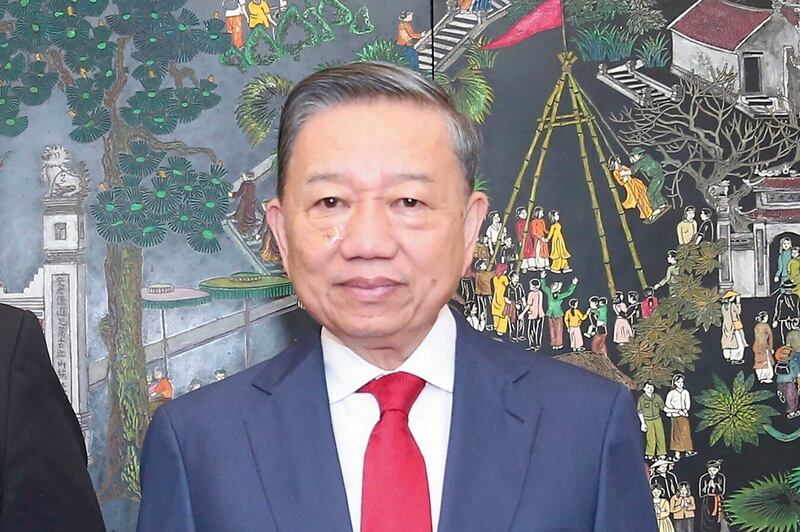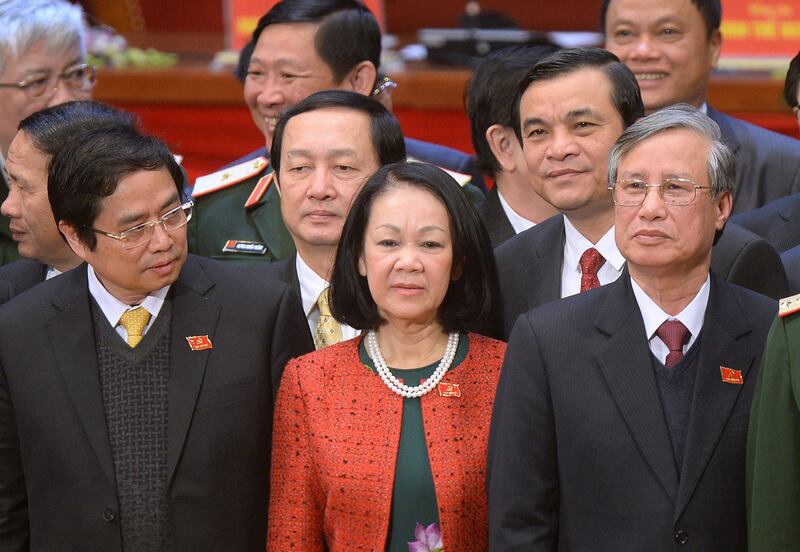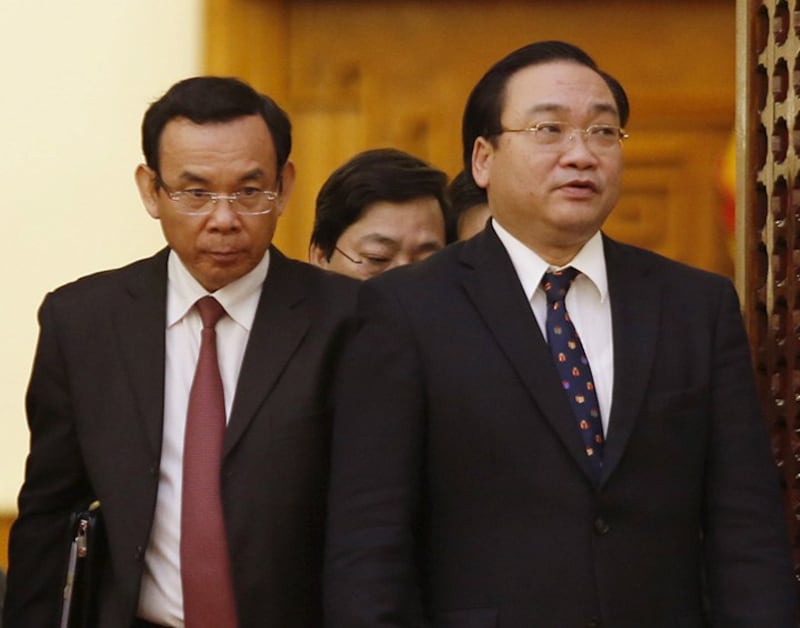The ouster this week of Vietnam’s National Assembly chairman Vuong Dinh Hue, the latest in a series of high-level officials to be removed in a wide-ranging anti-corruption campaign, sets the stage for more infighting at the top of the communist nation.
The Politburo of the Communist Party of Vietnam (CPV) voted to remove Hue in an emergency session on April 25; and the Central Committee voted to accept his resignation the following day.
Hue is the fifth Politburo member to be ousted this term, falling to the "Blazing Furnace" anti-corruption campaign that has already claimed Deputy Prime Minister Pham Binh Minh, President Nguyen Xuan Phuc, economic commission chief Tran Tuan Anh, and President Vo Van Thuong.
The Politburo is currently down to 13 members in what has become a nasty battle of attrition, 19 months out from the 14th Party Congress in January 2026.
Hue’s removal clearly shakes things up in the race to be the next CPV General Secretary. Hue was one of four eligible candidates under existing party rules to succeed the three-term Nguyen Phu Trong.
The simple answer to the question what brought Hue down is power politics and ambition.

Hue was a leading candidate to be general secretary. He had been groomed for the position, having held leadership positions in the State Audit Office and the National Assembly, Hanoi party, and the Ministry of Finance.
But To Lam, the minister of public security, wants the job and has the immense investigative powers at his disposal to build a far reaching case into his rivals’ extended business dealings and personal lives.
Over the past few weeks, Lam presented evidence about Hue’s transgressions. This is what he did with Vo Van Thuong, where he laid out details regarding a VND16 billion (US$630,000) bribe. Lam expected Hue to behave like Thuong, who acknowledged his misdeeds and bowed out quietly; the soft landing was his reward.
By several accounts, Hue not only didn’t accept the soft landing, but denied all allegations, before threatening to spill the tea on his Politburo colleagues’ own business dealings.
Lam then moved with alacrity, and as always, the action began with the aide.
Airport arrest
Upon his return from a five-day official trip to China, police arrested Pham Thai Ha, 48, the deputy head of the National Assembly Office.
Ha, who has a PhD in finance, had been Hue’s assistant for 20 years. At every stage of Hue’s career, beginning in the State Audit Office, and the at the Ministry of Finance, the Central Economic Commission, and lastly the National Assembly, Ha had served as Hue’s deputy.
Ha was arrested at the airport, apparently in front of his boss just for added psychological effect.
His arrest was part of an investigation into Thuan An Joint Stock Company, a relatively small developer that had a fortuitous run, securing 38 of 47 government tenders for major infrastructure projects.
The firm’s leadership was detained on April 15. Its general director has been charged with bribery, while its deputy director general is being held and investigated for bribery and bid-rigging. In all, six people have been arrested, including three officials in Bac Giang province.
On April 19, the Central Inspection Commission, the party body charged with investigating corruption amongst senior level officials, opened its formal investigation into Hue. Its chairman, Politburo member Tram Cam Tu, established a nine-member panel to lead the investigation.
On April 21, the Ministry of Public Security announced that Ha would be prosecuted for “abusing his position and powers to influence others for profit,” a violation of Clause 4, Article 358 of the Criminal Code. The following day, the Supreme People’s Procuracy authorized the search of Ha’s home and office.
Hue’s personal life – including multiple allegations of mistresses, which have long been a staple on social media – destroyed any hope of him surviving.

On April 26, the Central Committee accepted the resignation of Hue, once seen as the man most likely to lead the party from 2026-2031.
Hue’s removal forced a major reshuffle of senior-level positions during an April 26 meeting of the Central Committee.
Vietnam has already been without a president since February. The removal of Hue, leaves a second of the “four pillars” of Vietnam’s collective leadership empty. But the National Assembly chief matters much more.
Vietnam’s National Assembly is an outlier amongst legislatures in communist regimes, in that it is not a rubber stamp. It is one of the most trusted political institutions in the country, relatively transparent, and one that tries to hold leaders to account.
More importantly, there are a host of laws and pieces of implementing legislation that need to be passed.
Shaky party ‘pillars’
The Central Committee has reportedly appointed Truong Thi Mai, who is currently the head of the CPV Secretariat, to be the new National Assembly chair. That decision, along with the formal resignation of Hue, will be taken up when the National Assembly convenes in May.
Mai has considerable experience in the legislature. From 2016-2021, she served on the National Assembly’s Standing Committee, which both leads the legislature and acts in its name when it is not in session.
But there are a number of other senior-level vacancies that the Central Committee must take up.
Mai will have to be replaced at the CPV Secretariat, which is responsible for the party’s day-to-day affairs.
The name being floated about is General Luong Cuong, who is currently the head of the general political department of the People’s Army of Vietnam, making him the military’s top political commissar.
As in China, the People’s Army is the armed wing of the Communist Party and legally bound to defend the party and socialist system ahead of the state. Party control of the military is paramount.
It is not clear at this time whether Cuong would retire from the military, or stay in uniform. Vietnam has different norms of civil-military relations.
The chairmanship of the Central Committee’s Organization Commission (the CPV’s HR department) has been empty since March 2023, which is inexplicable given that planning for the 14th Congress in January 2026 is underway.
The presidency has been vacant since February. There are two candidates to succeed Vo Van Thuong: Tran Thanh Man and Nguyen Van Nen. This will be finalized at the May National Assembly session.
It appears that Hue will get a soft landing, as have all the other senior officials who have been ousted in the past 17 months. He was photographed at the tomb of Ho Chi Minh with other senior leaders ahead of the Central Committee meeting.

While Lam may want a final nail in the coffin of a political rival, it seems that Nguyen Phu Trong has protected his former protege from any further attacks.
Hue’s removal makes Lam’s promotion to the post of CPV general secretary, more likely. There are now only two other eligible candidates, Mai and Prime Minister Pham Minh Chinh.
But to be sure, Vietnamese politics have never been this nasty nor institutionally destructive.
What has been done under the Blazing Furnace banner – ostensibly to legitimize the graft-tainted ruling party – has led to greater delegitimization in the eyes of the Vietnamese people, who see just how endemic corruption is amongst the senior leadership.
Zachary Abuza is a professor at the National War College in Washington and an adjunct at Georgetown University. The views expressed here are his own and do not reflect the position of the U.S. Department of Defense, the National War College, Georgetown University or Radio Free Asia.
